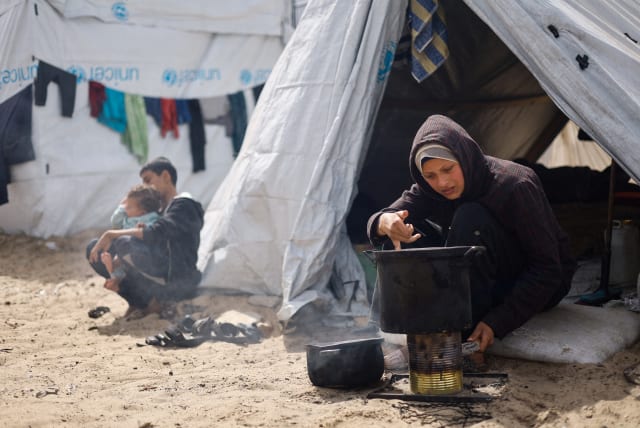UK set to consider parliament debate on Palestinian visa program

British committee set to discuss Palestinian visa program after a petition received more than 100,000 signatures.
A British committee is set to discuss holding a parliamentary debate to establish a Palestinian visa program after a petition for such a scheme received more than 100,000 signatures.
Petitions that reach that amount of signatures are “almost always” debated in parliament, a British parliamentary website states.
Alison Phipps, a professor and UNESCO Chair in Refugee Integration through Languages and the Arts at the University of Glasgow, told The Media Line that a debate would happen with normal proceedings.
Conservative Party refutes claims they will allow Palestinian visa plan
However, the governing Conservative Party has taken a strong position on wanting to decrease immigration in the UK and, in the past, has said it had no plans to create a separate visa program for Palestinians.
“We'll now have to probably put a wee bit of pressure on our elected representatives so that a debate can be held and we can hear the arguments on all sides democratically,” she said.
The committee that decides whether a debate is held comprises MPs from the government and opposition parties.
Debates that are triggered by petitions are held on Monday afternoons.
Proponents of the petition argue that Palestinians should be able to enter the UK under a similar program that was set up for refugees from Ukraine, which allowed them to join relatives already in the UK or be hosted and supported by a family in the country.
Phipps believed that the British government gave Ukrainians a specific visa program because it sided with Ukraine in the war, whereas it is siding with Israel in the conflict in Gaza.
The Ukrainian programs were not the only time the British government set up special schemes for foreigners seeking refuge.
Amid mass protests in Hong Kong in 2020, the UK government established a visa program for people who held British National Overseas passports, created when the UK gave control of Hong Kong to China in 1997.
Phipps said family reunion programs in which Palestinians join relatives already in the country would be a wise way to begin, as it would speed up the integration process by having newcomers supported by those who have already settled in the country.
“They already know the ropes; they can already provide accommodation. They know how to help people with their needs. They have an intimacy that means that people feel safe very quickly and are in a place where they can begin their recovery,” she said.
Earlier this month, a tribunal ruled against the UK’s Home Office, the department responsible for immigration, who refused to provide a decision on family reunification applications for families in Gaza to join sponsors in the UK because they could not provide biometric data, such as fingerprints.
The judgment stated that it was “irrational and unreasonable” for the Home Office to state that the families had not proved that a journey to a visa application center would be unsafe.
A UK government website states that people applying for a Ukraine visa program between March 2022 and last December could wait until they entered the UK to provide their biometrics.
Cecilia Correale, a solicitor at the Islington Law Centre, who helped bring the legal challenges against the Home Office, told The Media Line there will also be consequences for other families.
“This is not just a win for this case and for these families, but it is a recognition of why there’s a problem in the Home Office policy, and so it's likely to impact other families who are trying to reunite, but who can't travel to visa application centers to have their applications considered substantively,” Correale said.
Almost sixty organizations, including charities and law firms, as well as MPs, have also urged the government to establish a visa scheme for people in Gaza.
Andy Slaughter, an MP with the opposition Labour Party, has said that Palestinians should get access to similar programs as those for refugees from Ukraine.
“Every month, I’m asked why there are not similar visa schemes to allow Palestiniansto join their relatives in the UK or be hosted by families who wish to give them refuge here,” Slaughter said in parliament last month.
The BBC reported that MPs and members of the UK's House of Lords sent a letter to the head of the Home Office, James Cleverly, in March. The letter stated that the government should "extend a similar framework of compassion and solidarity” for people in Gaza as it did for people fleeing Ukraine and Afghanistan.
Jerusalem Post Store
`; document.getElementById("linkPremium").innerHTML = cont; var divWithLink = document.getElementById("premium-link"); if (divWithLink !== null && divWithLink !== 'undefined') { divWithLink.style.border = "solid 1px #cb0f3e"; divWithLink.style.textAlign = "center"; divWithLink.style.marginBottom = "15px"; divWithLink.style.marginTop = "15px"; divWithLink.style.width = "100%"; divWithLink.style.backgroundColor = "#122952"; divWithLink.style.color = "#ffffff"; divWithLink.style.lineHeight = "1.5"; } } (function (v, i) { });

